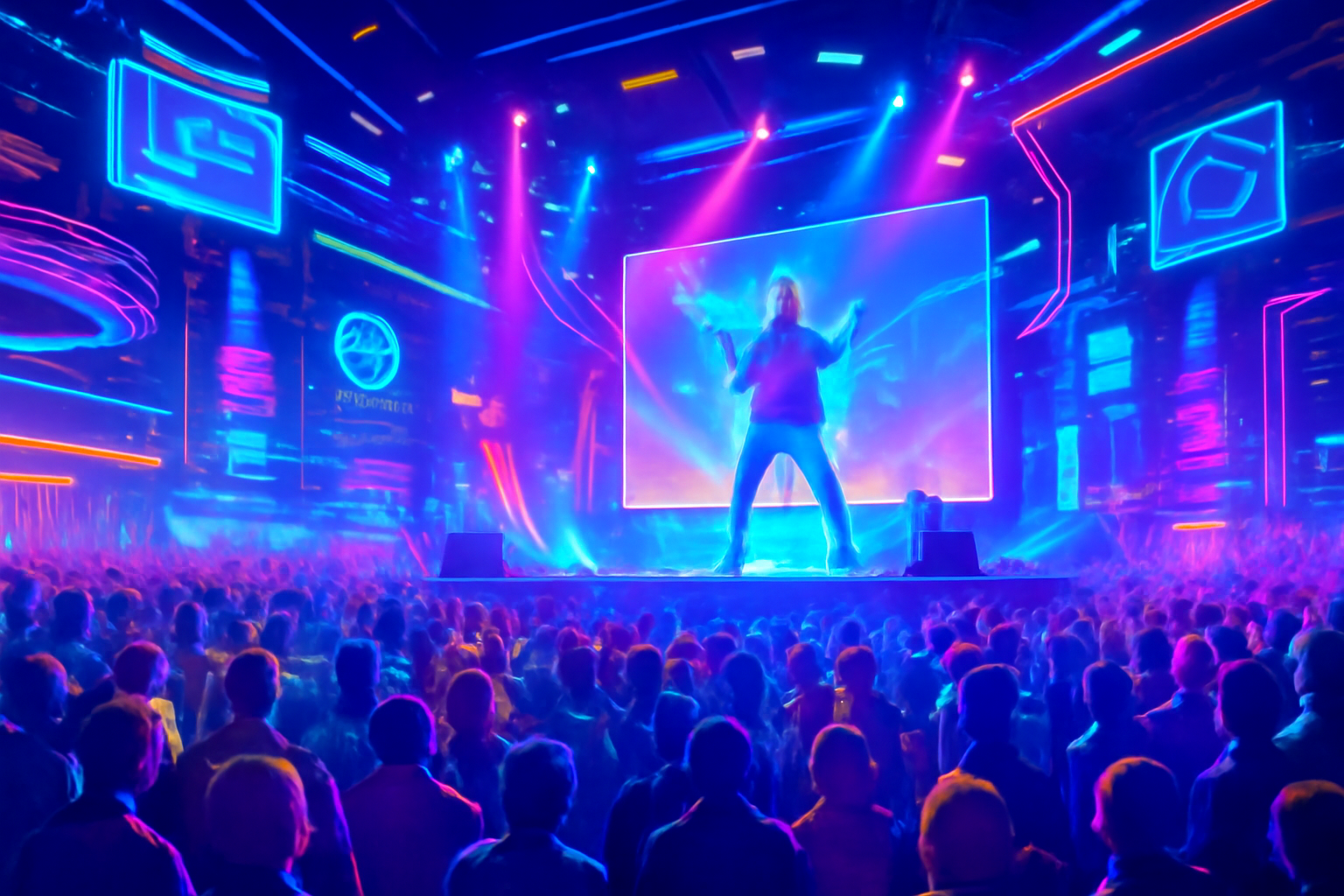Virtual Concerts and Metaverse Events: The New Era of Live Entertainment
Virtual concerts and metaverse events are revolutionizing live entertainment by offering immersive, accessible, and interactive experiences. Discover how technology is reshaping music performances and transforming fan engagement worldwide.

The entertainment landscape has been evolving rapidly over the past decade, but nothing quite compares to the seismic shift brought about by virtual concerts and metaverse events. What once seemed like a futuristic fantasy has now become a mainstream phenomenon, transforming how audiences experience live entertainment. As technology advances and digital platforms grow more sophisticated, virtual concerts and metaverse events are reshaping the industry by offering unprecedented levels of accessibility, interactivity, and scalability.
In this blog, we will dive deep into the rise of virtual concerts and metaverse events, explore why they matter, and analyze their impact on the entertainment industry. Whether you’re a fan, artist, event organizer, or industry insider, understanding this shift is essential for grasping the future of live entertainment.
The Dawn of Virtual Concerts and Metaverse Events
What Are Virtual Concerts and Metaverse Events?
At their core, virtual concerts are live music performances streamed online, where audiences can watch and engage from anywhere in the world. Unlike traditional concerts, these events don’t require physical presence, enabling fans to experience music and entertainment through their devices computers, smartphones, VR headsets, or gaming consoles.
Metaverse events take this concept further by placing the entire experience within a digital universe a persistent, interactive 3D environment where users create avatars and navigate spaces that mimic real-world venues or entirely fantastical landscapes. These immersive experiences are often hosted on platforms like Decentraland, Roblox, Fortnite, or proprietary metaverse applications, allowing participants to socialize, explore, and engage with the event and other attendees on a new level.
The Technology Powering the Shift
The growth of virtual concerts and metaverse events is fueled by multiple technological advances:
- High-Speed Internet and 5G: Reliable, fast internet is essential to stream high-quality video and real-time interactions without lag.
- Virtual Reality (VR) and Augmented Reality (AR): These technologies provide immersive, sensory experiences that make virtual events feel tangible.
- Blockchain and NFTs: These tools help monetize digital assets like tickets, merchandise, and exclusive content.
- Cloud Computing and AI: Cloud platforms allow seamless scaling to accommodate large audiences, while AI enhances personalization and moderation.
Accessibility: Entertainment Without Borders
One of the most revolutionary aspects of virtual concerts and metaverse events is how they democratize access to entertainment.

Breaking Geographical Barriers
Traditional concerts require fans to be physically present at a venue, which often means expensive travel and accommodation costs. Virtual events eliminate these barriers, allowing people worldwide to participate from their homes. Whether you’re in a rural village, a different continent, or simply unable to attend due to mobility issues, virtual concerts offer an inclusive platform for enjoying live music.
Affordability and Convenience
Virtual concerts are often more affordable or even free compared to physical concerts, making them accessible to a wider demographic. Fans can attend without dealing with long queues, traffic, or venue restrictions. This convenience opens up live entertainment to new audiences who might have otherwise been excluded.
Expanding Fan Engagement
Because virtual concerts don’t have physical space limitations, they can accommodate tens of thousands, sometimes millions, of participants simultaneously. This scale means artists can reach new fans globally, growing their community without geographical constraints.
Interactivity: A New Dimension of Audience Engagement
Virtual concerts and metaverse events are not just passive viewing experiences; they redefine audience engagement in groundbreaking ways.
Real-Time Interaction
Many platforms enable fans to interact with artists in real time through live chats, emojis, and virtual applause. Some even offer Q&A sessions, shout-outs, and other interactive features that mimic the energy of a physical concert.

Customizable Avatars and Socializing
In metaverse events, attendees create personalized avatars that can move around, dance, or explore different parts of the virtual venue. This avatar-driven interaction fosters a sense of presence and community, allowing friends and strangers to socialize and share the experience together.
Gamification and Immersive Experiences
Organizers often integrate gamified elements like scavenger hunts, virtual merchandise shops, and mini-games to enhance engagement. These features transform the concert into an interactive playground, offering unique experiences that are impossible in traditional live shows.
Scalability: The Power to Grow Without Limits
Virtual concerts are inherently scalable, breaking down physical constraints and opening new revenue and marketing opportunities for artists and organizers.
Unlimited Audience Size
Unlike traditional venues, virtual platforms can handle vast audiences simultaneously. Major events have seen millions of viewers tuning in, with the infrastructure designed to scale dynamically based on demand. This scalability translates into significant revenue potential without the need for expensive physical logistics.
Multiple Event Formats
Metaverse events can vary widely in format single performances, multi-day festivals, or even ongoing worlds where music, art, and entertainment blend continuously. This flexibility allows creators to experiment with new types of events that keep audiences coming back.
Data-Driven Insights
Virtual events generate rich user data from attendance patterns to interaction metrics which artists and organizers can use to tailor future experiences. This data-driven approach helps optimize marketing, enhance fan satisfaction, and maximize revenue streams.
Notable Virtual Concerts and Metaverse Events That Made History
Travis Scott’s Fortnite Concert
One of the most famous early examples was Travis Scott’s virtual concert inside the video game Fortnite in 2020. The event attracted over 12 million concurrent viewers, offering a surreal, visually spectacular show with psychedelic graphics, interactive stages, and avatar-driven fan engagement. It set a benchmark for how gaming and music could merge, breaking records for virtual concert attendance.

Ariana Grande’s Rift Tour
Following the trend, Ariana Grande’s Rift Tour also took place within Fortnite, combining cutting-edge visuals with live performances. The event featured multiple “acts,” unique avatar skins, and a story-driven concert experience, highlighting the potential for narrative-driven virtual concerts.
BTS and Blackpink in Virtual Spaces
Global K-pop sensations BTS and Blackpink have embraced virtual concerts on various platforms, including metaverse spaces. Their events often feature augmented reality effects and exclusive virtual merchandise, expanding their already massive fanbases by leveraging digital innovations.
Tomorrowland’s Virtual Festivals
Tomorrowland, one of the world’s biggest electronic music festivals, pivoted to virtual festivals during the pandemic. Their digital editions featured elaborate virtual stages, DJ performances, and interactive environments that captured the festival’s spirit and community vibe in a virtual format.
Impact on the Entertainment Industry
New Revenue Models
Virtual concerts unlock innovative monetization methods, including:
- Ticket sales for exclusive virtual access or VIP experiences
- Sales of digital merchandise and NFTs
- Brand sponsorships and in-event advertising
- Subscription models for ongoing content
These diverse streams allow artists to diversify their income beyond traditional touring.
Changing Artist-Audience Relationships
Virtual platforms blur the line between artists and fans, fostering more intimate and direct connections. Fans can influence performances, interact live, and participate in fan-driven communities in ways that were impossible before.
Environmental Benefits
By reducing the need for travel and physical infrastructure, virtual concerts contribute to a lower carbon footprint, aligning with growing concerns over climate change and sustainability in the entertainment sector.
Challenges and Criticisms
Despite their advantages, virtual concerts face hurdles:
- Technical Barriers: Not everyone has access to the required technology or reliable internet.
- Authenticity Concerns: Some fans miss the raw energy and physical presence of in-person concerts.
- Monetization Balance: Finding pricing models that satisfy both fans and artists can be tricky.
The industry continues to innovate to address these issues, aiming for hybrid models that combine the best of both worlds.
The Future: Hybrid Events and Beyond
Looking forward, virtual concerts and metaverse events are expected to coexist alongside traditional live performances, creating hybrid experiences that leverage the strengths of both formats. Imagine attending a live show with AR enhancements, or watching a concert from home with full avatar interaction and social spaces.
As technology advances, expect even more immersive experiences with haptic feedback, smell-o-vision, and AI-driven personalization. The metaverse promises a future where entertainment is borderless, interactive, and constantly evolving.
Conclusion
Virtual concerts and metaverse events are not just a pandemic-era novelty—they represent a fundamental shift in how live entertainment is produced, delivered, and experienced. With their unparalleled accessibility, interactivity, and scalability, these digital experiences are redefining the relationship between artists and audiences.
For fans, this means unprecedented access to global events and new ways to engage with music and culture. For artists and organizers, it opens new creative and financial possibilities that transcend the limitations of physical venues.
As this new era unfolds, staying informed and adaptable will be key for anyone involved in the entertainment industry. The metaverse is here, and it’s changing the show forever.




